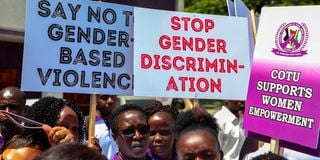African leaders should support framework to end violence against women, girls

The Central Organization of Trade Unions mark 16 Days of Activism at Solidarity House Nairobi, on December 8, 2022.
This week, from July 17 to 20, 2023, the world converges in Kigali, Rwanda, for the Women Deliver conference, a gathering of key voices and perspectives in the struggle for gender equality.
The timing couldn’t be more crucial. With rollbacks in women’s rights occurring around the globe, the conference offers hope that the push for equality has not stalled. Indeed, it is charging forward, and significantly, on African soil.
Twenty years ago, Africa adopted the Maputo Protocol, a landmark regional convention securing the rights of African women and girls and addressing key problems, such as women’s roles in the political process, the end of harmful traditional practices, and violence against women and girls.
Now, Africa has the opportunity to lead a global effort to end violence against women across the world. We are part of an organisation called Every Woman Treaty, a coalition of more than 2,800 women rights activists and organizations calling for a new binding framework to end violence against women and girls.
With the Maputo Protocol, Africa has made significant progress in advancing women's rights and combating gender-based violence. Building on this foundation, African nations and the African Union can leverage their regional expertise and experiences to shape and contribute to a global instrument.
Violence
Why support a new instrument? Because violence against women and girls remains the most widespread human rights crisis of our time, with 1 in three women ravaged by violence across the globe, according to the World Health Organization. Following Covid-19, UN Women found that 1 in 2 women reported that they or a woman they know have experienced violence.
Here in Africa, rates of intimate-partner violence remain high. In our professional roles, we read UN data that describes violence against women and girls in some African nations as “alarming.” We see female patients who have been beaten so badly by their husbands that they need medical attention. Girls are raped by neighbours and then forced to marry the perpetrator. The examples are endless.
A new binding framework can reinvigorate Africa’s efforts to stop this violence and broaden its leadership to a global perspective. Often maligned and traditionally sidelined as a “beneficiary,” there is no better time for African leaders to provide a platform and be the convener.
Making a public statement in support of a new binding instrument, which could take the form of an Optional/Additional Protocol to CEDAW (the Convention on the Elimination of All Forms of Discrimination Against Women), benefits Africa and the world.
Economically, violence against women and girls costs nations more than conflict and terrorism combined. Lower rates of violence stand to improve economies around the globe.
A global treaty will likely attract attention and resources from international organizations, donor countries, and global initiatives, helping mobilize additional funding, technical expertise, and support for African nations in addressing violence against women and girls.
Transparency
With the creation of a new metrics-based monitoring system, African nations have a new, simple tool to report their progress. This contributes to transparency, data collection and continuous improvement in addressing the issue.
By endorsing new global binding mechanisms, African nations and the African Union demonstrate their commitment to ending violence against women, which encourages countries to fulfil their obligations, report on progress and take concrete actions to prevent and respond to violence.
This week, as the world gathers in Kigali to consult, consider, confirm and celebrate the crusade for gender equity, in the spirit of the Maputo Protocol, we urge all African nations and the AU to publicly call for a new binding instrument to end violence against women and girls.
Together, we can drastically reduce the plague of violence against women.
Let us leverage African wisdom, experience and foresight, let us take inspiration from Rwanda, a country that has rebounded from unspeakable violence, to ensure that together, we deliver for women and girls, everywhere.
Marlene Mporanyi, MD, (Rwanda) is a Global Health Specialist. Eva Ng'inja-Croft (Kenya) is a Human Rights Lawyer




